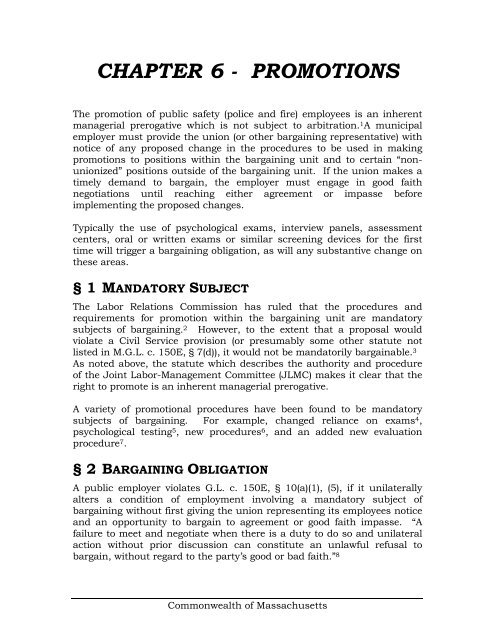Management Rights - AELE's Home Page
Management Rights - AELE's Home Page
Management Rights - AELE's Home Page
Create successful ePaper yourself
Turn your PDF publications into a flip-book with our unique Google optimized e-Paper software.
CHAPTER 6 - PROMOTIONS<br />
The promotion of public safety (police and fire) employees is an inherent<br />
managerial prerogative which is not subject to arbitration. 1 A municipal<br />
employer must provide the union (or other bargaining representative) with<br />
notice of any proposed change in the procedures to be used in making<br />
promotions to positions within the bargaining unit and to certain “nonunionized”<br />
positions outside of the bargaining unit. If the union makes a<br />
timely demand to bargain, the employer must engage in good faith<br />
negotiations until reaching either agreement or impasse before<br />
implementing the proposed changes.<br />
Typically the use of psychological exams, interview panels, assessment<br />
centers, oral or written exams or similar screening devices for the first<br />
time will trigger a bargaining obligation, as will any substantive change on<br />
these areas.<br />
§ 1 MANDATORY SUBJECT<br />
The Labor Relations Commission has ruled that the procedures and<br />
requirements for promotion within the bargaining unit are mandatory<br />
subjects of bargaining. 2 However, to the extent that a proposal would<br />
violate a Civil Service provision (or presumably some other statute not<br />
listed in M.G.L. c. 150E, § 7(d)), it would not be mandatorily bargainable. 3<br />
As noted above, the statute which describes the authority and procedure<br />
of the Joint Labor-<strong>Management</strong> Committee (JLMC) makes it clear that the<br />
right to promote is an inherent managerial prerogative.<br />
A variety of promotional procedures have been found to be mandatory<br />
subjects of bargaining. For example, changed reliance on exams 4 ,<br />
psychological testing 5 , new procedures 6 , and an added new evaluation<br />
procedure 7 .<br />
§ 2 BARGAINING OBLIGATION<br />
A public employer violates G.L. c. 150E, § 10(a)(1), (5), if it unilaterally<br />
alters a condition of employment involving a mandatory subject of<br />
bargaining without first giving the union representing its employees notice<br />
and an opportunity to bargain to agreement or good faith impasse. “A<br />
failure to meet and negotiate when there is a duty to do so and unilateral<br />
action without prior discussion can constitute an unlawful refusal to<br />
bargain, without regard to the party’s good or bad faith.” 8<br />
Commonwealth of Massachusetts
















